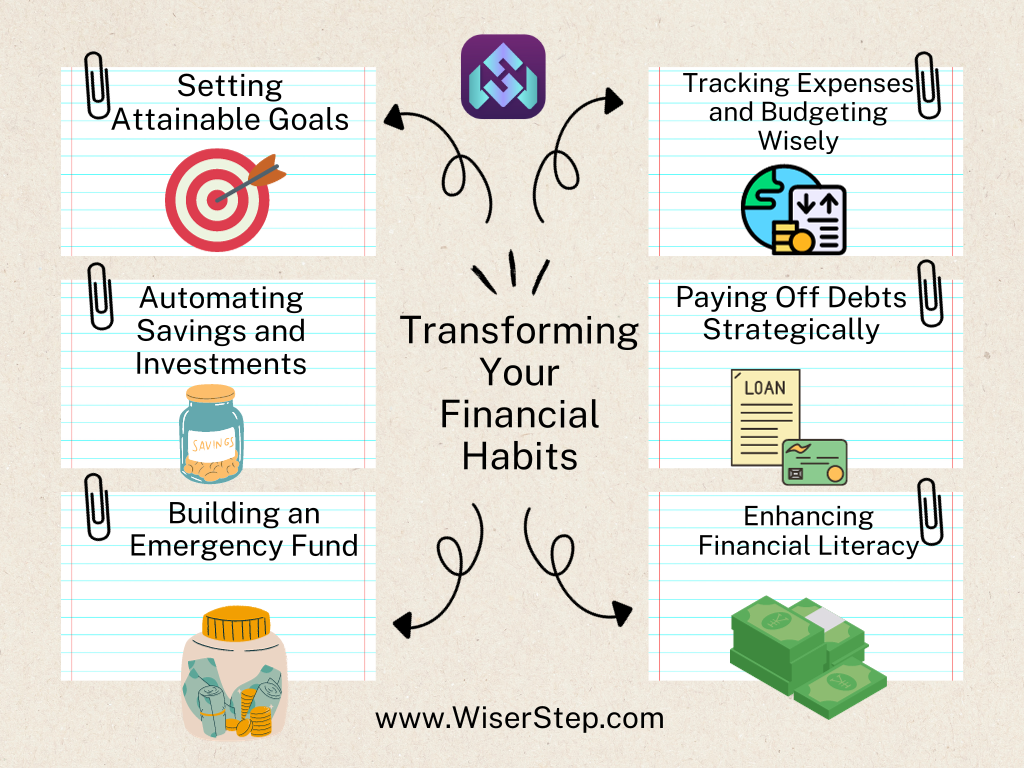We all aspire to achieve financial stability and security, yet the path toward this goal can seem daunting. However, the journey toward financial wellness isn’t about making drastic changes overnight; it’s about embracing small, consistent steps that lead to significant transformations. Transforming your financial habits is a journey that involves patience, dedication, and the willingness to make incremental changes. Let’s explore how small steps can bring about significant improvements in your financial life.
Understanding the Power of Small Changes
Transforming your financial habits starts with understanding the impact of small changes. Often, it’s not the grand gestures but the small, consistent actions that pave the way for lasting improvements. Whether it’s saving a little more each month, curbing unnecessary expenses, or starting an emergency fund, these seemingly minor adjustments accumulate into substantial progress over time.
Setting Attainable Goals
Begin by setting achievable financial goals. These goals should be specific, measurable, attainable, relevant, and time-bound (SMART). For instance, aim to save a certain percentage of your income each month, pay off a specific debt amount by a set deadline, or start investing a small sum regularly. These attainable goals provide direction and motivation for your financial journey.
Tracking Expenses and Budgeting Wisely
Track your expenses diligently to understand where your money goes. Use budgeting tools or apps to categorize spending and identify areas where you can cut back. Create a realistic budget that allocates funds for necessities, savings, debt repayment, and discretionary spending. Even small adjustments, like reducing dining out expenses or renegotiating subscription fees, can make a notable difference.
Automating Savings and Investments
Take advantage of automation to facilitate savings and investments. Set up automatic transfers from your paycheck to a savings or investment account. This approach ensures that a portion of your income is allocated toward your financial goals before you even have the chance to spend it impulsively.
Paying Off Debts Strategically
If you have debts, strategize your repayment plan. Consider the snowball or avalanche method—paying off debts either from the smallest balance to the largest or from the highest interest rate to the lowest. Consistently making slightly larger payments than the minimum can expedite debt clearance and save money on interest in the long run.
Cultivating Healthy Spending Habits
Identify your spending triggers and work on cultivating healthier habits. Pause before making impulse purchases and ask yourself if it aligns with your financial goals. Practice mindful spending by focusing on needs rather than wants. Delay gratification for non-urgent purchases and consider whether the expense is essential.
Building an Emergency Fund
Start building an emergency fund, even if it’s with small contributions. Aim to save an initial amount, such as $500 or $1000, and gradually increase it to cover three to six months’ worth of living expenses. Having this safety net can prevent financial stress when unexpected expenses arise.
Enhancing Financial Literacy
Commit to learning more about personal finance. Read books, follow financial blogs, or attend workshops to expand your financial knowledge. Understanding concepts like investing, budgeting, and managing debt empowers you to make informed decisions.
Celebrating Milestones and Staying Consistent
Acknowledge and celebrate every milestone achieved. Whether it’s paying off a credit card, reaching a savings target, or consistently sticking to your budget for a month, celebrate these wins. This positive reinforcement encourages consistency and motivates further progress.
Conclusion: Embracing Change, One Step at a Time
Transforming your financial habits is a journey that requires patience and perseverance. By embracing small, consistent changes, you can make significant strides toward financial wellness. Remember, every positive financial habit cultivated contributes to a stronger financial foundation. Embrace the journey, stay committed to your goals, and witness the profound impact of these small steps on your financial well-being.

